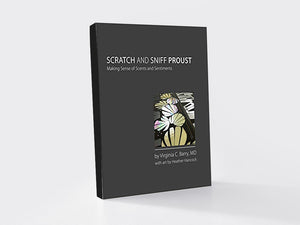about the book

Introduction
Meet Dr. Virginia Barry, the Author of Scratch and Sniff Proust; an interactive take on the neuroscience of smell and Marcel Proust’s work.

Memory of Smell
We come into the world equipped with several sensory systems. Here we consider how smell is different from all the other senses.

On Consciousness
Explore the different types of consciousness and unconsciousness that drive our thinking and influence the way we see the world.

On Olfaction
Learn how evolution has determined the neuroanatomy of our sense of smell. Smell is our oldest sense; perhaps our most refined sense.

On Emotion
Emotions contribute to who we are and help guide us in telling us how we feel about things. Proust strived to regain feelings lost over time.

On Memory
Memory helps us learn, grow, and plan for the future, but here we explore the kind of memory where emotion resides.

Embodied Cognition
We measure the world as it relates to our bodies. Here here we dive into the origin and meaning of certain expressions and gestures that arise from embodied cognition.

On Dreams
Dreams allow the unconscious to do its work using parallel processing instead of the linear processing that we use in our conscious minds. Here we look into the dream work that happens while we sleep.

On Psychoanalysis
Often smells will lead us to important memories that give insight into the long forgotten past and allow us to reclaim aspects of ourselves so that we can live authentically and in line with our true selves.
Purchase your copy
-
Scratch and Sniff Proust: Making Sense of Scents and Sentiments by Dr. Virginia Barry / art by Heather Hancock

- Regular price
- $35.00
- Sale price
- $22.99
About the Author
Virginia Barry is a psychiatrist and psychoanalyst in full-time private practice in Chicago. She has been on the Faculty of the Chicago Institute for Psychoanalysis since 1991 and has taught many clinical and theoretical courses to psychoanalytic candidates.
For more than a decade she has taught a course entitled “Mind & Brain” that introduces candidates to areas of neuroscience and cognitive science that have relevance for clinical and theoretical psychoanalysis. She is especially interested in thinking about the biology of meaning, the development of language from gesture, the isomorphism between the hierarchical organization of the brain and that of the mind, and the alterations of agency and motivation during the course of a psychoanalysis.
Dr. Barry lives in Evanston, Illinois with her two Bengal cats. She is the mother of two grown children, one a neuroscientist and the other a poet. In her spare time she writes fiction.


About the Artist
Heather Hancock creates visual experiences with glass.
Heather balances art with science in her Evanston studio. The conceptual foundation for her work comes from a decade-long career in healthcare as a speech pathologist and then as program director for the Department of Physical Rehabilitation and Medicine, University of Chicago at Weiss Hospital. A Mosaics Master Class in Venice, Italy provided the technical basis for her work. Heather uses this ancient medium as a conceptual tool to explore how people engage with information in the natural, manmade and social environments. Glass comes to life with motion and light. Viewers passing by glass mosaics become participants in interaction with a series of moments that illuminate a space.
Heather was born in Alberta, Canada and relocated to the Chicago area in 1993. She currently resides in Evanston with her husband and their two children. Whether skating at the lakefront pond, biking Chicago area trails or hiking the Rockies, Heather and her family can be found out-of-doors every chance they get.
The colorful images that scroll past as one navigates this website are works in glass created by Heather Hancock. They depict important moments in Remembrance of Things Past where Proust describes scents. Each mural corresponds to a Scratch and Sniff Proust chapter.
